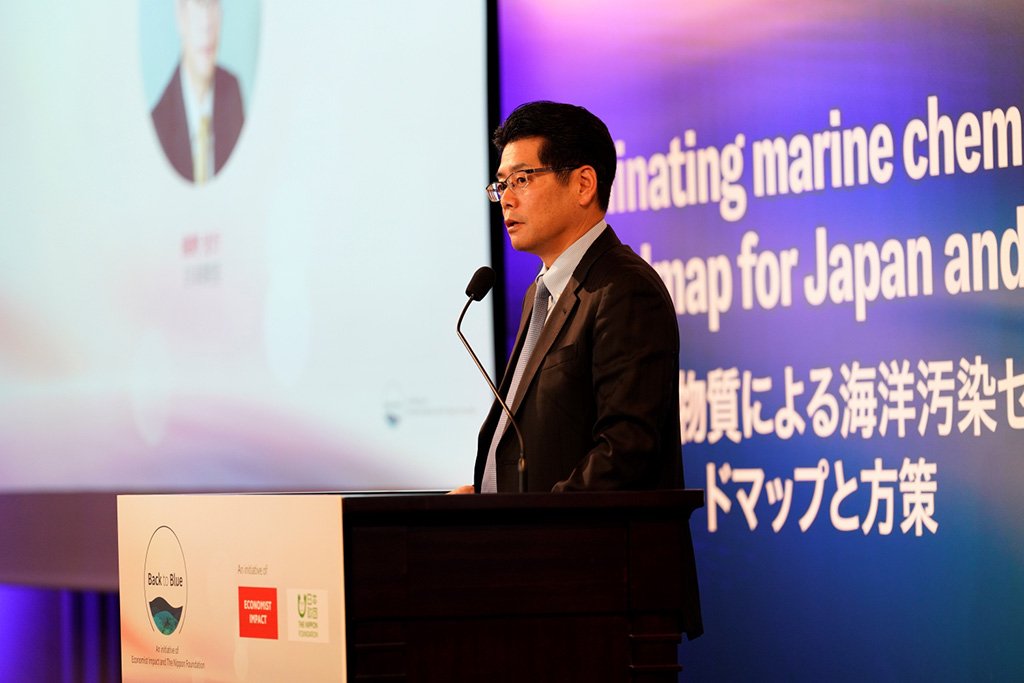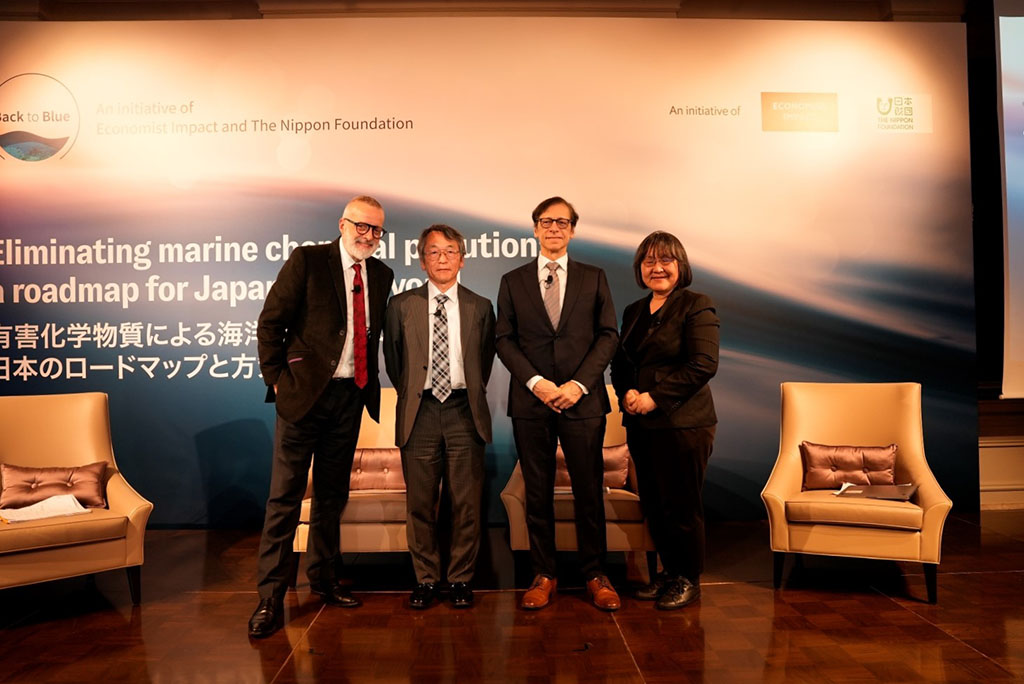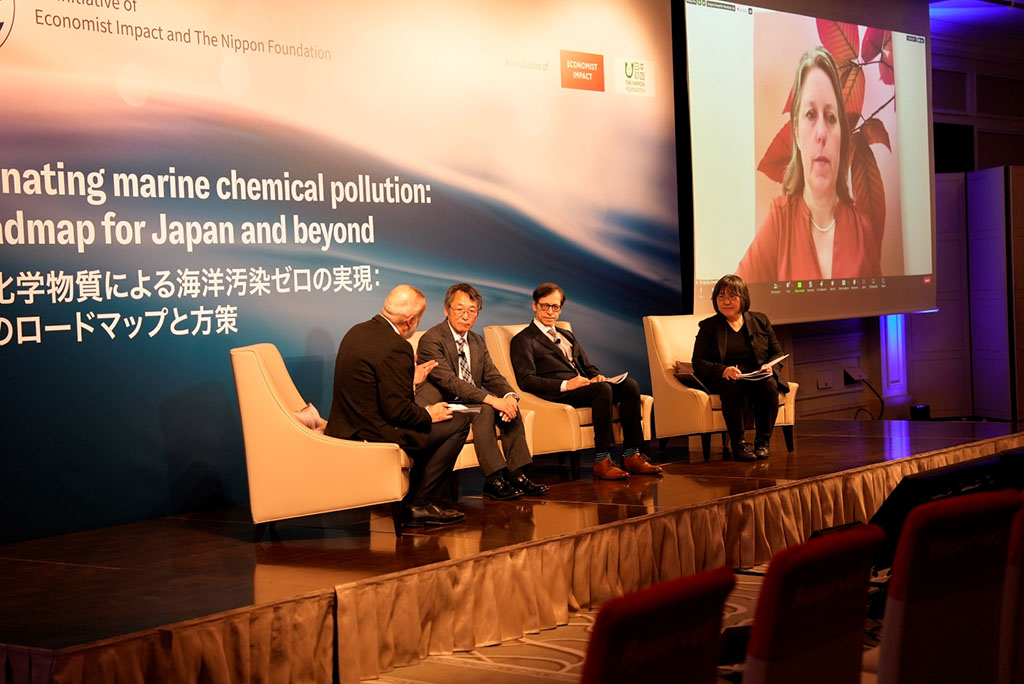Invisible Threats to Zero Marine Pollution TargetMarine pollution caused by toxic chemical substances and necessary countermeasures
As part of the Back to Blue initiative, jointly being carried out by The Nippon Foundation and Economist Impact (part of the Economist Group) to address marine environmental issues, an international symposium was held in Tokyo on February 6 to call attention to the toxic chemical substances that are an invisible component of marine pollution.


The event brought together research and policy experts on marine chemical pollution from Japan and overseas, including Richard Damania, Chief Economist of the World Bank’s Sustainable Development Practice Group, and Noriyuki Suzuki, a fellow at the Planning Division and the Health and Environmental Risk Division of Japan’s National Institute for Environmental Studies, to highlight the seriousness of marine chemical pollution and discuss steps that need to be taken going forward.
In his welcoming remarks, The Nippon Foundation Executive Director Mitsuyuki Unno talked about “ocean blindness,” referring to the fact that although humans cannot live without the ocean, that connection is being forgotten. He noted that there are three types of ocean blindness – “ignorance,” “indifference,” and “disregard” – and that he saw the symposium as a first step toward overcoming the walls of ocean blindness. He expressed his hope that that the discussions and the connections made there would continue to be nurtured on the Back to Blue platform and disseminated globally to inspire more action on marine chemical pollution in Japan and around the world.
Economist Impact’s editorial director Charles Goddard spoke about his initial surprise when he was writing a white paper on chemical pollution for the Back to Blue launch in 2021. He discovered a worryingly patchy understanding regarding the impact of chemical pollution, especially among policymakers, against a backdrop of no standardized vocabulary for related scientific data being used around the world. He also introduced a roadmap formulated by Back to Blue in which the international community bands together to remove the effect of harmful chemical substances on the ocean.
In an interview conducted remotely, Harvard University professor Elsie Sunderland stressed the importance of identifying the sources and taking measures against pollution, and of individuals taking an interest in events that are occurring today. Unless there are changes in the chemical substances and raw materials being used in industry today, there could be an impact on marine products, and public health will continue to worsen. She warned that not taking action against marine chemical pollution will have major consequences.
This was followed by a panel discussion with Frida Hök, deputy director of the Swedish NGO ChemSec (the International Chemical Secretariat), Mr. Suzuki, Mr. Damania, and professor Yukari Takamura of the University of Tokyo. They discussed the situation with regard to marine chemical pollution in Japan and around the world and the formulation of a global roadmap to eliminate its effects. The Japanese panelists pointed out that marine chemical pollution in Japan has been an issue that receives local attention, but Japanese people have little awareness of the scale and seriousness of pollution at the global level. They stressed the importance of Japan viewing chemical pollution as a global issue, conducting research and collecting sufficient related data, and raising awareness of the issue.
Ms. Hök, who is pursuing regulation against chemical pollution in the European Union, emphasized that public awareness alone is not enough to force industry to act, and in addition to the importance of regulation, the world needs to come together to protect the ocean, which connects all people on earth. She also noted that the fact that 90% of marine chemical pollution originates on land needs to be integrated into discussions on marine issues, and that she hopes that as a first step, interested companies, governments, scientists, and other stakeholders will work together to bring about action.

Panelists Comments (edited)
Frida Hök, Deputy Director, ChemSec (the International Chemical Secretariat)
Today we have been able to have a very useful discussion on the situation regarding marine chemical pollution in Japan and around the world, and on measures going forward. The ocean connects the world’s population, so it is important to work together internationally to do what we can now to make sure that the harmful chemical substances that we all use and flow into the oceans are used safely.
Richard Damania, Chief Economist, Sustainable Development Practice Group, World Bank
90%-95% of marine pollution comes from the land. Focusing on this entire cycle will help to put a focus on the problem of marine pollution and encourage the business community to take action. International regulations are one way to address this, but with each country thinking about its own interests, formulating regulations takes a great deal of time. The first thing we need to do is for countries and individuals to work together and take action to resolve issues.
Noriyuki Suzuki, Fellow, Planning Division and Health and Environmental Risk Division, National Institute for Environmental Studies, Japan
As scientists, we need to discuss this issue. The problem of marine pollution is thought of as separate from issues like the atmosphere and climate change. In addition, the research and data on marine pollution that exists is insufficient. Even with these shortcomings, we need to make recommendations to policymakers to address these issues.
Yukari Takamura, Professor, University of Tokyo
Japan’s Ministry of the Environment is formulating its next Basic Environment Plan. There is insufficient scientific data, however, on things like the sources of marine pollution and forecast data. This means that environmental problems are being treated as social issues. Even given this situation, however, the international community needs to work together and take a step-by-step approach to resolve these issues by creating a non-legally binding global platform.
The symposium can be viewed on YouTube at the following URL (in English)
Related Links
Contact
The Nippon Foundation
Ocean Affairs Dept.
- Email: kaiyo_info@ps.nippon-foundation.or.jp



